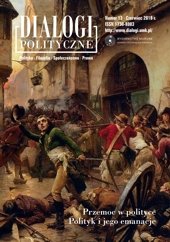Władca jako bohater. O myśli politycznej Thomasa Carlyle’a
DOI:
https://doi.org/10.12775/DP.2010.016Abstrakt
The article concerns Scottish historian and essayist Thomas Carlyle (1795- 1881) and his politcal ideas. Carlyle is famous for several works, the most important of which are now On Heroes, Hero-Worship, and the Heroic in History (completed in 1841). His ideas seem to be the reaction on the democratic reforms undertaken in Great Britain during his life, as well as on the French Revolution. To criticize the growing importance of parliament, Carlyle introduces the single heroic ruler with several virtues. Carlyle's hero is chosen and lead by the divine Providence. He is deeply religious, therefore illuminated and strenghtened by the divine light. The Providence reveals him not only his own path, but also the path of the whole society. Therefore the ruling hero always knows where to lead his people and what is good for them. These people are submitted to him, so that he can exercise the power which is not limited by any institution. Apparently his only limitation is his obedience to the divine spirit. That spirit gives the hero the ability to rule, which is the crucial term in Carlyle's concept of government. Most people, even amongst rulers, do not possess the real ability to rule, therefore they are a sort of usurpers; however there are few exceptionally gifted who are truly able to govern: only these ones can be called the kings. At this point, Carlyle contests the concept of the Divine right of kings, pointing out that the crown itself does not make a king. The true kingship is not hereditary but is the matter of God's choice. However, the heroic ruler needs to be acknowledged by his people. The problem here is that people's ability to recognise the true leader is very fallible. That is why Carlyle appeals to them to have their eyes open to discern the true hero when he appears. On the other hand, he admits that this fallability came from many experiences of usurping rulers that caused great distrust amongst the subjects. That distrust seems to be connected with the idea of democracy; Carlyle is saying that the growth of democracy and the French Revolution itself with its demands for equality was caused by the lack of faith in existence of he true heroes. Carlyle presents also the historical examples of the heroes. For him, the most important is Oliver Cromwell, the leader of the Puritan Revolution. Cromwell seems to have been chosen and gifted by the Providence; he is given the authority to reach the goal at all costs. That goal is the Calvinist–like theocracy, however with the hero as the head of the Church. That authority allowed Cromwell to engage himself in regicide and showed that hero is granted exceptional rights. The second example of hero is Napoleon Bonaparte; Carlyle describes him as the last greatest man. However, he did not fully accepted the ideas of the Protestant Revolution and was prone to compromise with the popery and the old regime.Reference
T. Carlyle, Bohaterowie, przeł. T. Macios, Kraków 2006.
Carlyle, red. A. W. Evans, London 1909.
Selection of Cromwell's proclamation of 1655, [w:] Documents Illustrative of English Church History, red. H. Gee, W. J. Hardy, London 1896, s. 584.
J. Symons, Thomas Carlyle: The Life and Ideas of a Prophet, New York 1952, s. 148.
Doktryny polityczne XIX i XX wieku, red. K. Chojnicka, W. Kozub-Ciembroniewicz, Kraków 2000.
Słownik społeczny, red. B. Szlachta, Kraków 2004, s. 825–826.
M. Soniewiecka, Fenomen bohaterstwa, „Pressje. Teki Klubu Jagiellońskiego” 2007, t. XII, s. 24.
D. Schlossberg, Religious Influences and the English Reading Public, http://www.victorianweb.org/victorian/religion/herb6.html#tc [dostęp: 7.02.2010].
A. J. Slavin, The new monarchies and representative assemblies: medieval constitutionalism or modern absolutism?, Lexington 1964, s. 3.
A. L. Cross, A Shorter History of England and Great Britain, New York 1920, s. 653–654.
B. Szlachta, Monarchia prawa? Angielska myśl polityczna doby Tudorów, Kraków 2008, s. 236.
L. Smith, Orientalist tropes in „The Hero as Prophet”, http://www.victorianweb.org/ victorian/authors/carlyle/heroes/smith10.html [dostęp: 13.02.2010].
G. K. Chesterton, Thomas Carlyle, London 1910, s.10.
M. Bizoń, Teokracja genewska Jana Kalwina a inkwizycja Hiszpanii. Rozważania o renesansowej teonomii, „Pressje. Teki Klubu Jagiellońskiego” 2008, t. XIV, s. 174, 180–181.
Stahování
Publikováno
Jak citovat
Číslo
Sekce
Stats
Number of views and downloads: 1033
Number of citations: 0



